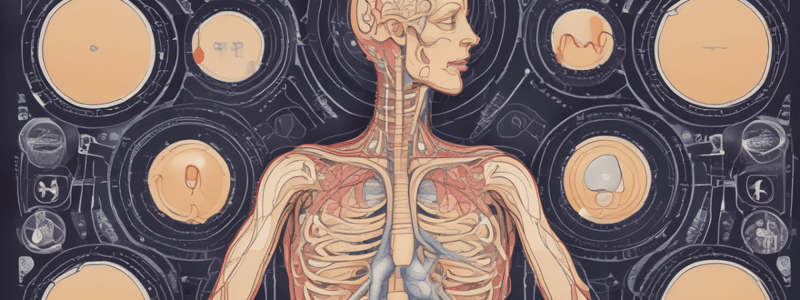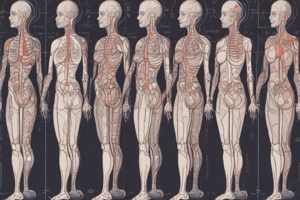Podcast
Questions and Answers
What is the primary link between the endocrine system and the nervous system?
What is the primary link between the endocrine system and the nervous system?
- Hypothalamus (correct)
- Thyroid gland
- Pituitary gland
- Pineal gland
What is the function of the releasing hormone released from the hypothalamus?
What is the function of the releasing hormone released from the hypothalamus?
- To stimulate the endocrine gland or organ
- To suppress the pituitary gland
- To act on cells in the pituitary gland to release a stimulating hormone (correct)
- To regulate sleep patterns
What is the role of melatonin in the body?
What is the role of melatonin in the body?
- Regulating sleep patterns (correct)
- Causing weight gain and sluggishness
- Causing hyperactivity
- Regulating rate of metabolism
What is the effect of excess thyroxine in the body?
What is the effect of excess thyroxine in the body?
What is the location of the parathyroid gland in the body?
What is the location of the parathyroid gland in the body?
What is the effect of a deficiency in thyroxine in the body?
What is the effect of a deficiency in thyroxine in the body?
Which hormone helps maintain the right balance of calcium in the bloodstream?
Which hormone helps maintain the right balance of calcium in the bloodstream?
What triggers the release of adrenaline and norepinephrine from the adrenal glands?
What triggers the release of adrenaline and norepinephrine from the adrenal glands?
What is the primary function of glucagon?
What is the primary function of glucagon?
What is the 'fight or flight' response triggered by?
What is the 'fight or flight' response triggered by?
What is the primary function of insulin?
What is the primary function of insulin?
Which glands produce the hormone adrenaline?
Which glands produce the hormone adrenaline?
What is the primary function of the endocrine system?
What is the primary function of the endocrine system?
Which gland is referred to as the 'master gland'?
Which gland is referred to as the 'master gland'?
What is the role of hormones in the body?
What is the role of hormones in the body?
What is the term 'hormone' derived from?
What is the term 'hormone' derived from?
What is the duration of hormone effects in the body?
What is the duration of hormone effects in the body?
What is the overall goal of hormone regulation in the body?
What is the overall goal of hormone regulation in the body?
Study Notes
The Endocrine System
- The endocrine system produces and regulates hormones, which are chemical substances that regulate all biological processes in the body from conception to old age.
Glands and Hormones
- The primary endocrine glands are the pituitary (master gland), pineal, thyroid, parathyroid, adrenals, ovaries (in females), and testes (in males).
- Hormones are chemical transmitters that regulate growth and development, mood, tissue function, metabolism, and sexual function.
- Hormones act slower than nervous impulses but cause longer-lasting effects, and are used to stabilize the body’s internal environment (homeostasis).
Hormone Function
- Hormones are chemical messengers that transfer information and instructions from one set of cells to another.
- Hormones can stimulate or suppress various bodily functions, such as growth, metabolism, and sexual function.
Adrenal Gland and 'Fight or Flight' Response
- The adrenal gland releases adrenaline and norepinephrine in response to perceived danger or threat, triggering the "fight or flight" response.
- This response prepares the body to "fight" or "flee" from harm by constricting blood vessels, increasing breathing and heart rate, and tightening muscles.
Pancreas and Glucagon/Insulin
- The pancreas produces the hormone glucagon, which converts glycogen back to glucose in the liver.
- The pancreas also produces the hormone insulin, which controls the conversion of blood glucose to glycogen, stored in the liver.
Reproductive Organs and Homeostasis
- The endocrine system and nervous system work together to maintain homeostasis, with the hypothalamus as the primary link between the two systems.
- The hypothalamus produces chemicals that either stimulate or suppress hormone secretions of the pituitary gland.
Hormone Communication
- Hormones follow a complex path to reach their target, involving releasing hormones, stimulating hormones, and endocrine glands or organs.
Main Glands and Hormones
- Hypothalamus: produces releasing hormones that stimulate or suppress hormone secretions of the pituitary gland.
- Pituitary Gland: often referred to as the "master gland" due to its control over other endocrine glands.
- Pineal Gland: produces melatonin, which regulates sleep patterns.
- Thyroid: produces thyroxine, which regulates the rate of metabolism.
- Parathyroid Gland: produces parathyroid hormone, which helps maintain the right balance of calcium in the bloodstream.
Studying That Suits You
Use AI to generate personalized quizzes and flashcards to suit your learning preferences.
Related Documents
Description
Test your knowledge of the endocrine system, its functions, and the glands and hormones that make it up. Learn how the endocrine system regulates biological processes from conception to old age.




